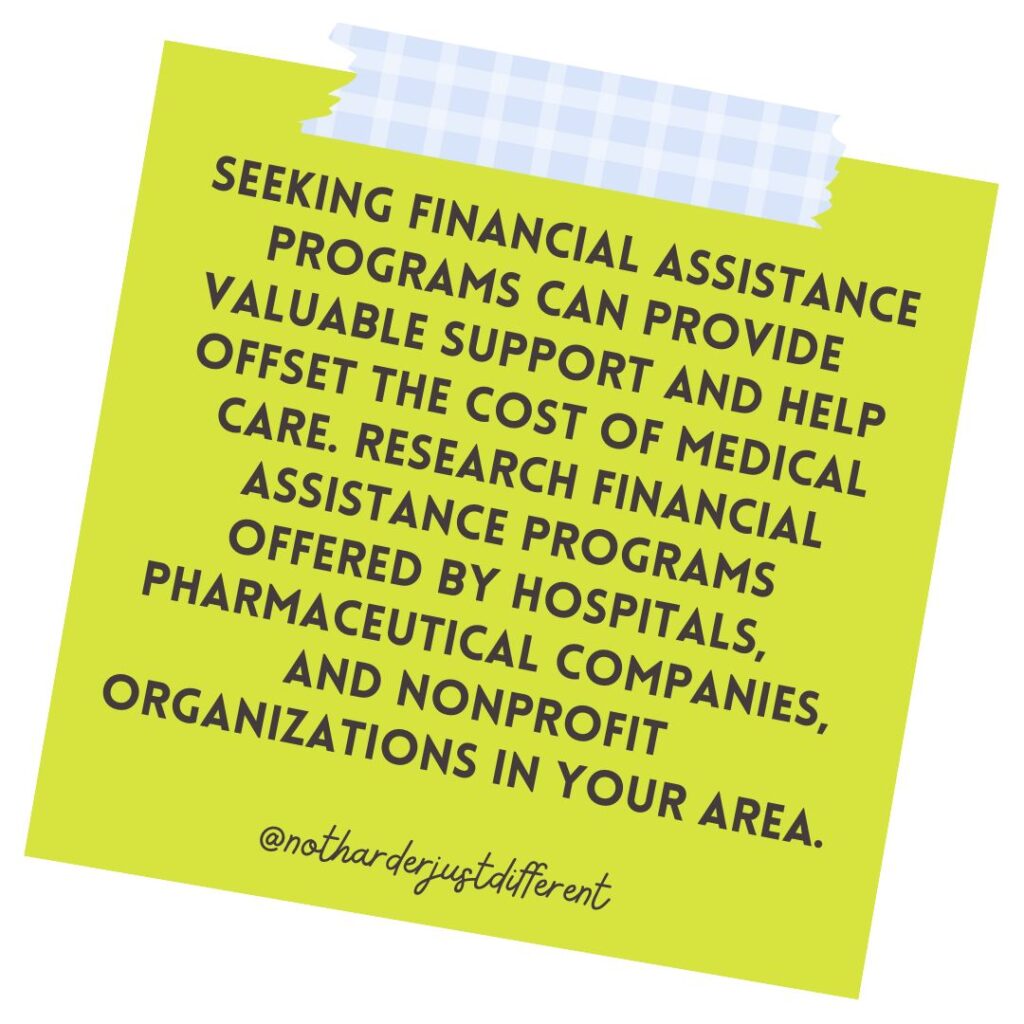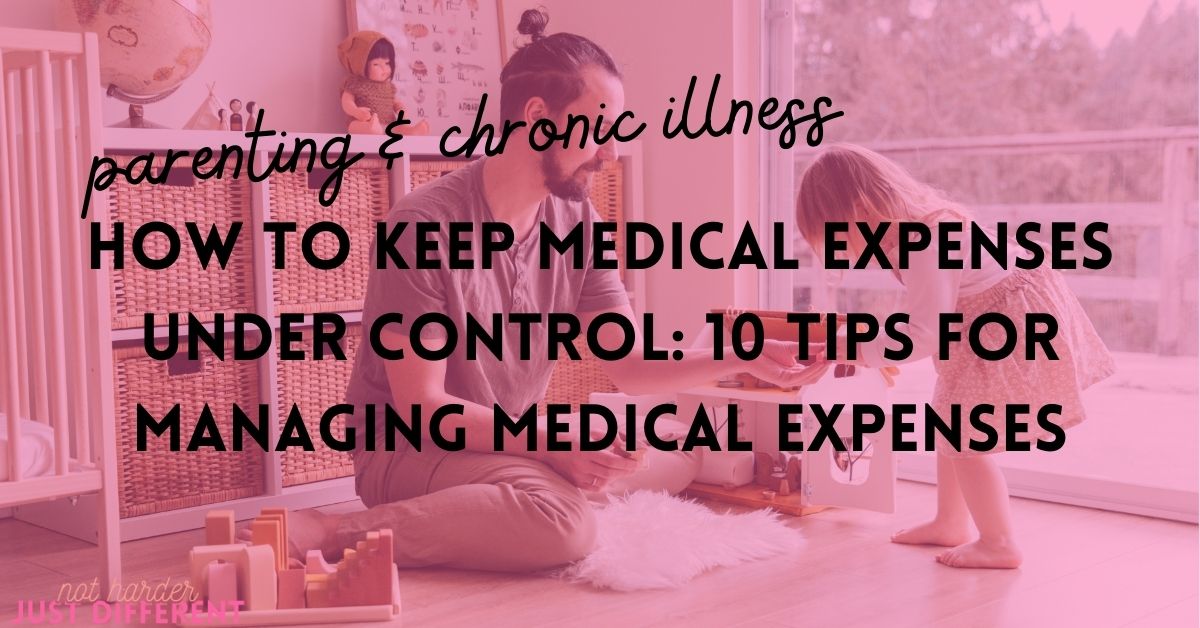Disclaimer: As a future Licensed Clinical Social Worker (LCSW) currently pursuing my master’s degree, I am passionate about sharing insights and information related to parenting, autism and homeschooling based on my personal experiences and research. However, the content shared on this blog is not intended to substitute professional advice, diagnosis, or treatment. Parenting is a deeply personal journey, and while I strive to provide valuable insights, every family and situation is unique. Readers are encouraged to consult with qualified professionals for personalized guidance tailored to their specific needs and circumstances.
Let’s have a chat about something that affects us all—managing medical expenses. We all know that healthcare costs can add up fast, but fear not! With a few savvy strategies and a little know-how, you can navigate the world of medical expenses like a pro.
Let’s face it—medical expenses can be a major source of stress and anxiety for many people. Whether you’re dealing with chronic conditions, unexpected illnesses, or routine healthcare needs, the cost of medical care can quickly add up. But don’t panic! There are strategies you can use to navigate the world of medical expenses with confidence and ease. By taking a proactive approach to managing your healthcare costs, you can minimize financial stress and focus on what matters most—your health and well-being.
Navigating the world of medical expenses can feel overwhelming, but with the right approach, you can take control of your finances and ensure that healthcare costs don’t break the bank. Whether you’re dealing with routine medical expenses or unexpected emergencies, we’ve got you covered with all the tips and advice you need to manage your medical expenses like a boss.
Quick Disclaimer: While I strive to provide helpful information, I am not a financial expert. It’s important to consult with a qualified financial professional before making any financial decisions. They can provide personalized advice tailored to your specific circumstances and help you navigate the complexities of financial planning, especially when dealing with chronic illness. Always seek professional guidance when in doubt.

10 Tips for Managing Medical Expenses
Understanding Your Insurance Coverage
Understanding your insurance coverage is crucial for managing medical expenses effectively. Review your insurance policy carefully to understand important details such as your deductible, copayments, and coinsurance. Take advantage of preventive care services covered by your insurance to catch potential health issues early and avoid costly medical bills down the road.
- Review your insurance policy to understand your deductible, copayments, and coinsurance.
- Take advantage of preventive care services covered by your insurance to avoid costly medical issues later on.
Exploring Cost-Saving Options
Exploring cost-saving options can help alleviate the financial strain of medical expenses. Ask your healthcare provider if there are generic versions of prescribed medications available, as they are often significantly cheaper than brand-name drugs. Additionally, consider using mail-order pharmacies or prescription discount programs to save on medication costs and other healthcare expenses.
- Ask your healthcare provider if there are generic versions of prescribed medications available.
- Consider using mail-order pharmacies or prescription discount programs to save on medication costs.
Negotiating Medical Bills
Negotiating medical bills can help reduce your out-of-pocket expenses and make healthcare more affordable. Ask your healthcare provider if they offer discounts for paying bills in full or setting up payment plans, as many providers are willing to work with patients to find a solution that fits their budget. Additionally, request an itemized bill and review it carefully to ensure accuracy and identify any potential errors or discrepancies that could be driving up the cost of your medical care.
- Ask your healthcare provider if they offer discounts for paying bills in full or setting up payment plans.
- Request an itemized bill and review it carefully to ensure accuracy and identify any potential errors or discrepancies.
Utilizing Flexible Spending Accounts (FSAs) or Health Savings Accounts (HSAs)
Utilizing flexible spending accounts (FSAs) or health savings accounts (HSAs) can help you save money on healthcare expenses while lowering your taxable income. Contribute to an FSA or HSA to set aside pre-tax dollars for medical expenses such as copayments, deductibles, and prescription medications. Then, use your FSA or HSA funds to pay for eligible medical expenses, including over-the-counter medications, eyeglasses, and certain medical supplies.
- Contribute to an FSA or HSA to set aside pre-tax dollars for medical expenses such as copayments, deductibles, and prescription medications.
- Use your FSA or HSA funds to pay for eligible medical expenses, including over-the-counter medications, eyeglasses, and certain medical supplies.

Seeking Financial Assistance Programs
Seeking financial assistance programs can provide valuable support and help offset the cost of medical care. Research financial assistance programs offered by hospitals, pharmaceutical companies, and nonprofit organizations in your area. Additionally, contact your local social services agency or patient advocacy groups for information on available resources and assistance programs that may be able to provide financial aid or other forms of support.
- Research financial assistance programs offered by hospitals, pharmaceutical companies, and nonprofit organizations.
- Contact your local social services agency or patient advocacy groups for information on available resources and assistance programs.
Exploring Telemedicine Options
Exploring telemedicine options can help you save time and money on non-emergency medical appointments. Consider using telemedicine services for routine medical issues that don’t require an in-person visit to the doctor’s office. Check with your insurance provider to see if telemedicine services are covered under your plan, and if so, what your copayment or coinsurance may be.
- Consider using telemedicine services for non-emergency medical issues to save time and money on office visits.
- Check with your insurance provider to see if telemedicine services are covered under your plan and what your copayment or coinsurance may be.
Managing Healthcare Costs During Open Enrollment
Managing healthcare costs during open enrollment is essential for ensuring you have the right coverage for your needs while keeping expenses in check. Take the time to review your healthcare plan options carefully, considering factors such as premiums, deductibles, and out-of-pocket costs. During open enrollment, consider switching to a high-deductible health plan paired with a health savings account (HSA) to take advantage of lower premiums and tax benefits, especially if you’re generally healthy and don’t anticipate needing extensive medical care.
- Review your healthcare plan options during open enrollment to ensure you’re getting the best coverage for your needs.
- Consider switching to a high-deductible health plan paired with an HSA to take advantage of lower premiums and tax benefits.
Avoiding Unnecessary Medical Expenses
Avoiding unnecessary medical expenses is key to keeping healthcare costs down and maximizing your budget. Ask your healthcare provider about alternatives to costly tests or treatments that may be equally effective. Additionally, seek second opinions before undergoing expensive or invasive medical procedures to ensure you’re making informed decisions about your healthcare.
- Ask your healthcare provider about alternatives to costly tests or treatments.
- Seek second opinions before undergoing expensive or invasive medical procedures.
Planning for Healthcare Expenses in Your Budget
Planning for healthcare expenses in your budget is essential for maintaining financial stability and preparedness. Include healthcare expenses such as insurance premiums, copayments, and prescription costs in your monthly budget to ensure you’re allocating funds appropriately. Set aside a portion of your income each month for healthcare expenses to build a financial cushion and cover unexpected medical costs as they arise.
- Include healthcare expenses such as insurance premiums, copayments, and prescription costs in your monthly budget.
- Set aside a portion of your income each month for healthcare expenses to ensure you’re prepared for unexpected medical costs.
Staying Informed About Healthcare Policy Changes
Staying informed about healthcare policy changes can help you navigate the evolving landscape of healthcare costs and coverage. Stay up-to-date on changes to healthcare policy that may affect your insurance coverage or out-of-pocket costs. Advocate for policies that promote affordable and accessible healthcare for all individuals, regardless of income or health status, and seek out resources and support to help you stay informed and engaged in healthcare policy discussions.
- Stay informed about changes to healthcare policy that may affect your insurance coverage or out-of-pocket costs.
- Advocate for policies that promote affordable and accessible healthcare for all individuals, regardless of income or health status.
Managing medical expenses can be a daunting task, but with the right knowledge and strategies, it’s entirely possible to navigate the complex world of healthcare costs effectively. By understanding your insurance coverage, exploring cost-saving options, and advocating for yourself when it comes to medical bills, you can take control of your finances and ensure that healthcare expenses don’t derail your financial well-being. Remember to stay informed about healthcare policy changes, plan for healthcare expenses in your budget, and seek out financial assistance programs when needed. With a proactive approach and a little bit of know-how, you can minimize the financial stress of medical expenses and focus on what truly matters—your health and well-being.

